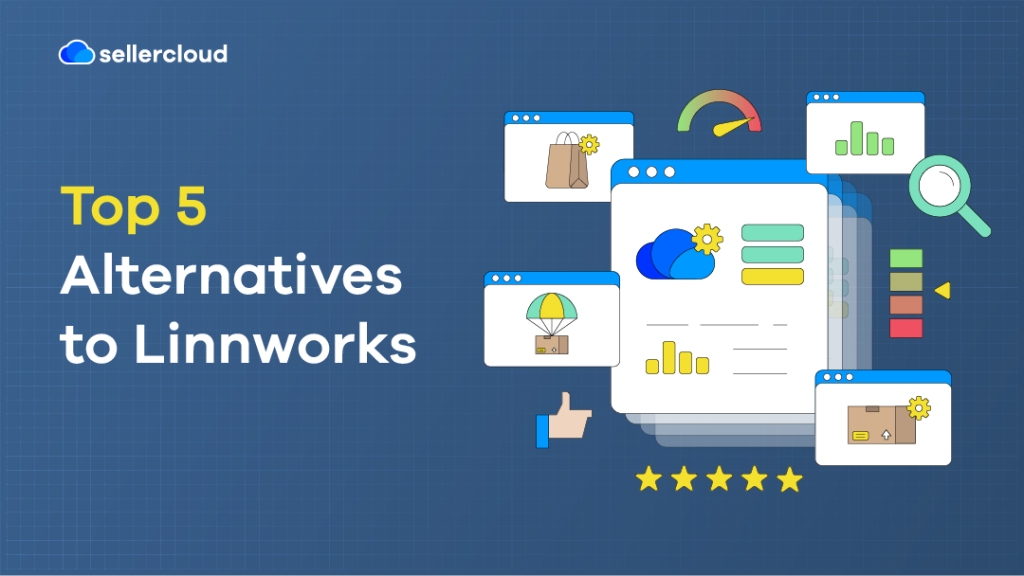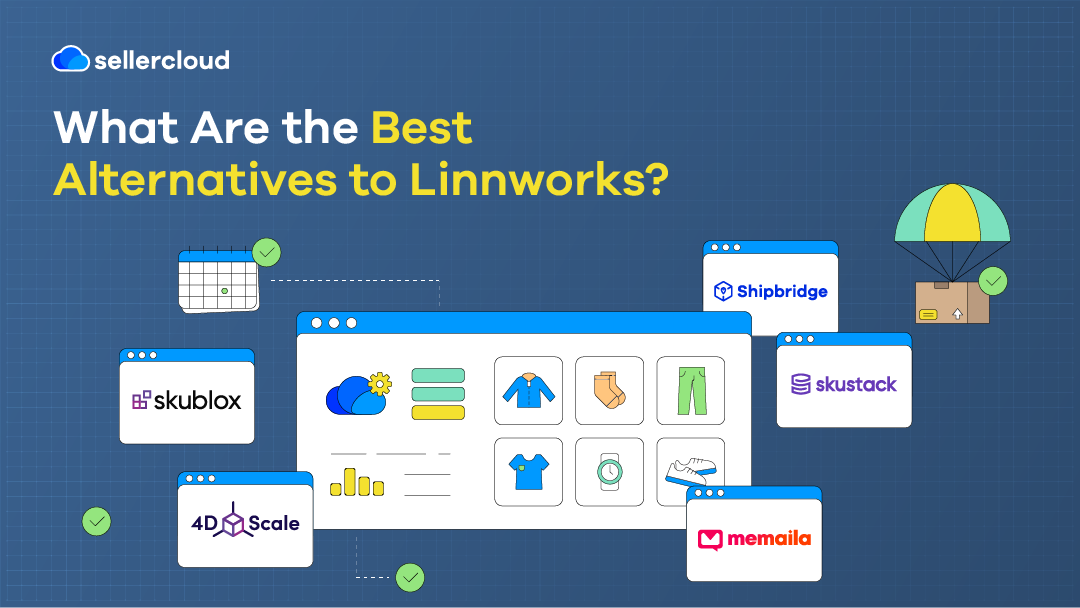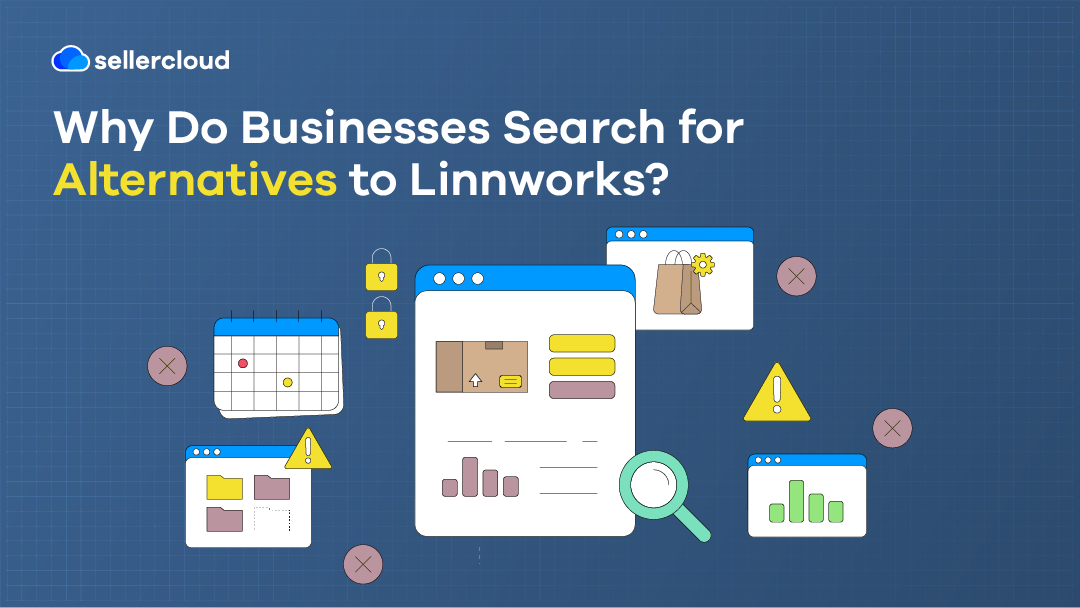
Sellercloud, Cin7, Deposco, Shipedge, and Zentail are the top alternatives to Linnworks. Read on to find out which solution is most suitable for your business.
Linnworks is a British ecommerce solution headquartered in Chichester, UK. It has been operating in the US since 2018 and has grown its market share through acquisition.
In May 2022, Marlin Equity Partners became a majority shareholder in Linnworks after making a significant investment.
A few months later, in September 2022, Linnworks acquired a competitor, SkuVault. Linnworks now offers SkuVault in two products: ‘SkuVault Core’ and ‘Enhanced Warehouse,’ which are only available in North America.
In this article, we’ll review the top five alternatives to Linnworks, why businesses look for alternatives, and how to choose the best for your business.
What Are the Best Alternatives to Linnworks?

Here are the top five alternatives to Linnworks.
1. Sellercloud
Sellercloud tops the list because it offers more features at fairer pricing without sacrificing one of Linnworks’ key features—customization.
Founded in 2010, today, Sellercloud handles $150 million in GMV (Gross Merchandise Volume) annually. Its pricing is better suited to support company growth, and its abundance of features covers almost every possible ecommerce business need.
Top Reasons to Consider Sellercloud:
- Over 280+ integrations—180 more than Linnworks.
- Far-reaching support coverage includes a 24/7 emergency support line, email support, ticket support, and premium and platinum support options.
- A wealth of purchasing features unavailable to Linnworks, such as linking a PO (purchase order) to an FBA shipment, sending POs straight to FBA from a vendor, cloning POs, and performing custom cost calculations.
- More reporting features than offered by Linnworks.
- Wide-ranging Amazon features, including consolidation of FBA shipments, Vendor Central, and Direct Fulfillment (all unavailable to Linnworks users).
- Native WMS (Warehouse Management System)—Skustack.
- Dedicated customization team that works with customers to build the custom solutions they need.
- Straightforward pricing—no revenue share required or multi-year contracts.
What Do Customers Have to Say about Sellercloud?
One Sellercloud review on Capterra said:
“My favorite thing about Sellercloud is their willingness and ability to customize the platform. For us, that meant building up the integration with Amazon custom and formatting the data that comes through in a way that is easy to use. They also built a custom invoice that makes it easier for our production team to fill orders accurately. Sellercloud has many integrations and features that I cannot even begin to touch on in 1,500 characters, but what I said about customizing the software to meet our needs is my top pick. This is a very robust and complex platform that I would highly recommend to a business that handles many online SKUs and orders from different sources.”
See how Sellercloud helped Trekline Motorsports significantly improve its workflow efficiency.
You can also check out Sellercloud’s case studies and testimonials. Request a demo today to learn more about Sellercloud.
What’s Sellercloud’s Pricing?
Sellercloud prides itself on its highly transparent pricing. Customers are charged based on the number of orders they process.
There are no surprise fees, and potential customers can experiment with Sellercloud’s pricing module on the pricing page to get a clear idea of how much it will cost them based on the orders they are currently handling.
Sellercloud does not:
- Charge per SKU (charges are order-based instead).
- Increase prices the more you sell.
- Charge for onboarding and implementation.
- Charge for customizations.
- Lock customers into multi-year contracts.
- Take a revenue share.
Sellercloud’s pricing plan is better suited for ecommerce companies. It helps nurture growth instead of taking a bigger slice of revenue for doing well. With Sellercloud, the more you sell, the lower your rate becomes.
You can also learn more about Skustack pricing here.
See how Sellercloud compares to Linnworks.
2. Cin7
Cin7 is a New Zealand-based alternative ecommerce solution. Like Linnworks, It received a major investment from an investment firm, which enabled it to grow considerably and gain market share through multiple acquisitions.
Top Reasons to Consider Cin7:
- Cin7’s 700+ integrations dwarf Linnworks’ approximately 100+.
- Better inventory management features than Linnworks, including the ability to update inventory from vendor feeds, a native WMS, and the reserve inventory for specific deals and channels.
- A wider offering of reporting features in comparison to Linnworks.
Limitations of Cin7:
- Cin7 does not offer shipping features—if you switch from Linnworks to Cin7, you will not have any shipping features.
- Cin7 cannot be customized. Cin7 is solely an ‘out-of-the-box’ solution.
- Unable to link PO to FBA shipment or send a PO straight to FBA from a vendor.
- Does not offer automatic inventory deductions for FBA transfers for Amazon Seller Central.
- Sellers have to request that marketplace integrations be enabled. Once enabled, then they can be configured.
- No custom reporting.
- No custom inventory calculations.
- No Amazon Buy Shipping In Bulk, which Linnworks offers.
- It does not enable sellers to create FBA inbound shipments.
- You cannot create shipping rules to automate and simplify shipping, but you can with Linnworks.
What Do Customers Have to Say about Cin7?
One TrustRadius review is particularly insightful into the pros and cons of using Cin7. On the positive side, they said:
“Cin7 is great because a business can set up quickly without having to invest in hardware/servers, and the business does not need to be concerned about backing up data. Cin7 software is easy and intuitive to use. The pricing was competitive for cloud-based software that can be customized to each business. The software is constantly updated so a business does not have to worry about paying for updates or paying a large lump sum to purchase new updated software.”
However, their review was not without some caveats, also adding:
“We experienced a significant price increase after 1 year. With purchased software, a business would not have to worry about unexpected pricing changes. Cin7 offers a useful integration with BigCommerce. Unfortunately, their own B2B website is lacking in features and ultimately not useful to our company. Cin7 does not provide the most useful customer service, as they only offer paid access to phone support. Most of our [issues] with the software were caused by updates in the software that were not announced, and they could only be fixed via email or tickets the next day.”
Interestingly, customers have switched from Cin7 to Sellercloud. One of which was DC Cargo, whose Director of Operations said:
“We couldn’t really rely on the data we were seeing on our screens because nothing could be scanned in or out. Inventory wasn’t current, and we couldn’t truly sell how we wanted. We couldn’t batch or sell in multiples we wanted, for example. We knew we needed something else if we really wanted to grow, so we started looking.”
What Is Cin7’s Pricing?
Cin7 costs a minimum of $325 monthly, though several add-ons can raise the price.
These include adding a POS, B2B portal, API access for integrations, ecommerce and app integrations, additional users, automation, and an advanced manufacturing module.
Cin7 also costs significantly less to start using too. While Linnworks can charge between $4,000 and $12,000 for onboarding, you will only need to pay between $750 and $1,500 for a personal or group implementation with Cin7.
How Does Cin7 Compare to Linnworks?
Cin7 offers a wealth of features that you cannot get with Linnworks. However, you will not be able to customize Cin7.
More importantly, Cin7 does not offer shipping features, which is a problem for many ecommerce sellers. This means they must find another solution for their shipping operations, which will increase operating costs and order complexity.
See how Cin7 compares to Sellercloud.
3. Deposco
Deposco’s ecommerce solution is called ‘Bright Suite.’ It offers customers more features than Linnworks but is significantly more costly.
Top Reasons to Consider Deposco:
- If you need better inventory management features, Deposco far exceeds what Linnworks offers.
- Deposco offers 200 integrations, while Linnworks has 100.
- With Deposco, you can use Amazon Vendor Central and Direct Fulfillment, which is great for large and bulk sellers and unavailable to Linnworks users.
Limitations of Deposco:
- Requires a three-year contract.
- Poor WMS, not user-friendly.
- It does not allow sellers to create FBA shipments, a major requirement for many businesses.
- The restocking module is a paid extra—price not disclosed.
- Some integrations are paid extra, but the price has not been disclosed.
- Long and expensive implementation process.
- No virtual warehouse options, which is a feature offered by Linnworks.
- Limited improvement in reporting, purchasing, and warehouse features compared to Linnworks.
- You cannot manage all your multi-channel listings in one place as you can with Linnworks.
- Deposco doesn’t offer customization for customers, which is something they can get from Linnworks.
What Do Customers Have to Say about Deposco?
According to reviews of Deposco’s Bright Suite on Gartner, one user wrote favorably that:
“I like how the Deposco single system simplifies our operations. Additionally, it is effortless to upload bulk data and submit sales orders, which enhances our efficiency and email [delivery].”
While a less favorable review wrote:
“Billing has been the largest hurdle for our team. There have been several issues regarding the accuracy of invoices and the calculations on the backend. We also find that inventory management can be difficult/impossible to trace.”
What Is Deposco’s Pricing?
If you are considering switching to Deposco, you must understand that they require a three-year contract. This could seriously impede your ability to become profitable if you are a small business.
Deposco provides quotes based on company size. Quotes often range between $50,000 and $65,000 annually, which means you could end up paying as much as $195,000 before you start using Deposco.
In addition, implementation costs $200 hourly and can take up to 700 hours. Thus, Deposco is the most expensive alternative to Linnworks.
How Does Deposco Compare to Linnworks?
As mentioned above, Deposco’s costs are extremely high, and they should be one of the first things you consider when comparing them to Linnworks.
Yes, Deposco offers more features, but you must decide if those features are worth the higher cost.
Furthermore, if you change to Deposco, you will lose crucial features that your business depends on, such as the ability to manage all your multi-channel listings in one place and customization.
See how Deposco compares to Sellercloud.
4. Shipedge
Overall, Shipedge offers more features than Linnworks, including customization, though the trade-off with certain features will be a dealbreaker for some ecommerce businesses.
Top Reasons to Consider Shipedge:
- A lot more reporting features in comparison to Linnworks.
- Many more shipping options in comparison to Linnworks.
- 135 integrations, which is slightly more than Linnworks.
Limitations of Shipedge:
- Shipedge charges per SKU, not per order, which means you are charged for every order item. In addition, Shipedge also charges per RMA SKU, so you pay for returned items.
- Charges a monthly minimum of $840—higher than Linnworks’ $350 monthly minimum.
- Different fees according to how many integrations you use.
- You cannot manage all your multi-channel listings in one place as you can with Linnworks.
- The startup plan does not include multi-warehousing options, so you must pay more if you have more than one warehouse.
- Customizations are available only on Enterprise-level pricing.
- The interface is not user-friendly.
- No premium support options.
- You cannot manage product images with Shipedge, but you can with Linnworks.
- The trade-off is not ideal in some areas, and you must adjust to a very different pricing model.
What Do Customers Have to Say about Shipedge?
On G2, Shipedge is currently rated 2.8 stars out of 5. In terms of pros, reviews mentioned ‘Inventory Management,’ ‘Functionality Features,’ and ‘Integration Ease,’ and in terms of cons, they mentioned ‘Expensive,’ ‘Integration Issues,’ ‘Learning Curve,’ ‘Poor Aesthetics,’ and ‘Poor Support.’
One five-star review said:
“The software is consistent and robust. Innovation is constant, and new features/integrations are released from time to time. Warehouse management is a complex topic and involves a large body of knowledge that needs to be converted into functionalities in software like a WMS. In this sense, Shipedge’s solution is comprehensive.”
Meanwhile, a zero-star review said:
“Dealt with glitches for more than a year before it was too costly to stay on. Several glitches amounted to thousands of dollars. Customer service was half decent if you could get [a hold] of them, but never seemed to solve anything completely. I think these guys bit off more than they could chew.”
What Is Shipedge’s Pricing?
Shipedge charges a minimum of $840 monthly, and various other features can increase this price significantly. For example, Shipedge’s WMS will cost a further $390 monthly.
However, one of the most important aspects of Shipedge’s pricing is that it is based on the number of SKUs processed monthly.
With Shipedge, you are charged $99 for every 1,000 SKUs processed. However, once you reach 200,000 SKUs, the charge increases to $3,000.
Shipedge also includes EDI transactional charges, an implementation fee, and integrations are also paid.
How Does Shipedge Compare to Linnworks?
While Shipedge offers more features than Linnworks, there are plenty of vital features you will have to live without, making it a tough comparison.
For example, while Shipedge does not allow you to manage all your multi-channel listings in one place or manage product images, it automatically creates kits and allows you to list the same product in multiple categories with shadow listings.
Despite the above, Shipedge is a good alternative to Linnworks because it also offers customization.
See how Shipedge compares to Sellercloud.
5. Zentail
Great option for businesses looking for more catalog and listing features, but you will lose important purchasing, warehouse, and shipping features.
Top Reasons to Consider Zentail:
- Manage all your multi-channel listings in one place as you can with Linnworks.
- More reporting features, including settlement reconciliation and adding custom reports (unavailable to Linnworks users).
- More catalog features, including automatic kit creation, the ability to list the same product in multiple categories with shadow listings, and set dropshipping preferences on each product.
Limitations of Zentail:
- Zentail doesn’t provide purchasing features, so you need an additional solution.
- Roughly half the number of integrations as Linnworks.
- Zentail uses SkuVault for its WMS, so if you switch from Linnworks, you will use the same WMS. If SkuVault’s WMS is one of your pain points, Zentail is not a good option.
- Zentail is not customizable, unlike Linnworks.
- No FBA shipments—an important requirement for any business that runs most of its orders through FBA.
- Very few integrations—approximately 50.
- Zentail’s ecommerce solution primarily focuses on product listing and is lacking in other areas.
- Zentail does not offer inventory management features, a major requirement for many ecommerce businesses.
- No low stock alerts to re-order.
- You will lose the purchasing features offered by Linnworks, such as the ability to create and receive POs, predictive purchasing, and estimated delivery on a PO.
What Do Customers Have to Say about Zentail?
One review on Capterra summarized:
“It was a great tool to help us understand how multi-channel fulfillment tools in general work as it tries to simplify everything to the lowest level it can. However, it caused a lot of issues with Jet and plummeted that marketplace. Constant uphill battle with that marketplace using this tool.”
In terms of pros, they said:
“You create one product, fill it with as much information as you can, and [Zentail] goes to work publishing your product in as many marketplaces as you want (or can afford as some are paid). The support team is phenomenal.”
However, in terms of cons, they added:
“Very expensive for what it does. As of the time we left, we were paying and didn’t feel like our business was getting the benefit.”
What Is Zentail’s Pricing?
Much of the costs of using Zentail are tied to your Amazon GMV (Gross Merchandise Volume).
Zentail’s base fee is $4,500 monthly, charged to customers with an Amazon GMV of $2,000,000. An additional $7,500 is charged for off-Amazon orders, bringing the total to $12,000 annually.
Zentail adds $7,500 to your fee when your off-Amazon orders exceed $500,000 in revenue. For every SKU sold over their 10,000 SKU limit, you are charged $0.08 per SKU.
How Does Zentail Compare to Linnworks?
Zentail is a good alternative to Linnworks if you’re looking for better catalog features and similar ordering features.
However, Zentail falls short regarding purchasing, warehouse, and shipping features. Furthermore, if your business is looking for alternatives to Linnworks’ WMS SkuVault, Zentail is not a good option.
See how Zentail compares to Sellercloud.
Why Do Businesses Search for Alternatives to Linnworks?

Many businesses leave Linnworks because its ecommerce solutions don’t work well, its onboarding process is unsatisfactory, and it is expensive.
Linnworks’ solutions don’t work well because its offering is a hodgepodge of multiple software solutions the company has acquired.
It is similar to other solutions, such as Rithum (formerly known as ‘ChannelAdvisor’), which was created by acquiring ten companies and combining their ecommerce solutions.
Linnworks offers two primary products, SkuVault Core and Linnworks Advanced. Both offer various features, making it difficult for sellers to decide which option is better.
For example, while Linnworks Advanced is the pricier option, it doesn’t include all the features offered by SkuVault Core, as you might expect. You would lose access to stock forecasting and quality control features.
That is unless you pay for additional modules or ‘add-ons.’ SkuVault Core users can add Enhanced Warehouse, and Linnworks Advanced users can add listing, forecasting, and warehousing features—all at an additional cost.
You pay for individual modules because these add-ons were once individual solutions provided by different companies that Linnworks acquired, not developed.
This is crucial as it makes Linnworks’ solution less stable and causes integration issues.
The cost of using Linnworks is another significant factor that has turned away many users. One review written in 2022 on TrustRadius summarizes it pretty well:
“Would have recommended it 5 years ago, but now absolutely not a chance. Pricing is obscene and the service is appalling. Save yourself time and money by looking elsewhere. Linnworks has one advantage over other providers and that is their integrations with smaller eCommerce channels, this is not worth the money… You could employ someone for 5 minutes per day to pull smaller marketplaces onto a different service via CSV.”
Linnworks also charges for customizations and custom fields. While customization is a highly sought-after feature, alternatives like Sellercloud have pre-existing customizations and custom fields that must be configured. Sellercloud is also open to custom development on request.
Ultimately, the costs of using Linnworks exceed the value of its ecommerce solution, and customers look elsewhere.
How to Choose the Best Alternative to Linnworks?
When searching for an alternative ecommerce solution, your first step should always be to focus on where it falls short of your expectations. In this case, how is Linnworks not meeting your business requirements?
With these requirements identified, determine what you need to fill those requirements. Ask yourself:
- What features do we need to improve efficiency?
- What do we need that Linnworks doesn’t offer?
- What Linnworks features are difficult to use?
- What Linnworks features could be better?
With your list of requirements, analyze the ecommerce solutions available and identify which best fills the gaps in your current workflow.
Bear in mind that you might not find a perfect alternative for Linnworks.
For example, switching from Linnworks to Shipedge will allow you to create kits automatically and list the same product in multiple categories, but you will lose the ability to manage all your multi-channel listings and product images in one place.
Furthermore, you must factor in the costs of these different solutions before committing to any change. Remember that one of the biggest reasons businesses seek a Linnworks alternative is that it is too expensive for what it offers.
Ultimately, you must balance what you deem a fair cost and the features your business needs most.
Why Is Sellercloud the Best Alternative to Linnworks?
On a cost-based comparison, businesses get much more from Sellercloud than Linnworks for a lot less.
Most importantly, Sellercloud is a more reliable solution that does not suffer from the same integration problems as Linnworks.
Linnworks’ approach to building an ecommerce solution includes buying out competitors like SkuVault.
To summarize, Sellercloud is the most cost-effective and feature-effective alternative to Linnworks and doesn’t sacrifice customization or the stability of its solution.
Key Points
You’ll now have no problem finding the best Linnworks alternative for your business. Remember these key points.
- Linnworks is a UK ecommerce solution that received a significant investment in 2022 and later acquired SkuVault in the same year.
- The top alternatives to Linnworks include Sellercloud, Cin7, Deposco, Shipedge, and Zentail.
- Businesses look for alternatives to Linnworks because it’s expensive, its solutions don’t integrate well, and its onboarding process needs improvement.
- When looking for alternatives to Linnworks, businesses should consider an ecommerce solution that balances the features your business needs with a fairer price.
- Sellercloud is the best alternative to Linnworks because it is cheaper and offers more features, including customization.
Linnworks FAQs
Where Is Linnworks Based?
Linnworks is headquartered in Chichester, UK, and has locations in Austin, Texas, Kentucky, and Tallinn, Estonia.
Who Owns Linnworks?
Marlin Equity Partners, headquartered in Los Angeles, California, has had a majority share in Linnworks since 2022 and has completed over 190 acquisitions.
Marlin Equity Partners’ investment helped Linnworks expand in the US and acquire SkuVault.
What Is the Market Share of Linnworks?
According to Enlyfy data, approximately 245 companies use Linnworks, equating to a market share of approximately 1.1%. Linnworks is more popular in the UK than in the US.
However, according to Linnworks ‘About Us’ page, they reached 4,000 customers in September 2022 (the same month they acquired SkuVault).




